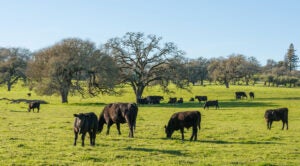California is a state that has never shied away from extreme agricultural policy. This happens despite the fact that the state is quite dependent upon its agricultural industry — it’s home to over 400 different ag commodities, grows over a third of the country’s vegetables and nearly three-quarters of the country’s fruits and nuts, and has the only Mediterranean climate in North America. Yet there is a lot of disconnect between the history of farming and ranching and certain groups of people who don’t agree with the practice of producing food.
The gap between anti-agriculturists and those who rely on the ag industry for their livelihoods, despite many efforts to connect the two through industry marketing and various other methods, allows for policies like Measure J to gain traction.
Measure J is an initiative that was introduced in Sonoma County, California, by a group calling itself the Coalition to End Factory Farming. The initiative was approved by the county clerk and registrar of voters earlier this spring after receiving over 19,000 signatures. The coalition behind it is largely made up of different animal activist groups, including the infamous Direct Action Everywhere, which has a history of questionable tactics, from trespassing onto farming operations, targeting FFA and 4-H students, and even posing as a Smithfield Foods CEO in an interview with Fox Business in 2020.
The measure looks to phase out exclusively “large CAFOs” within three years, which includes around two-dozen farms — to be more exact, 10 egg farms, four broiler farms, six dairies and one duck farm. A snapshot pulled from the EndFactoryFarming.vote page lists the specific businesses that will be affected, should this initiative pass:

According to the coalition, they relied upon the Environmental Protection Agency’s definition of CAFOs in order to define what a “large” CAFO is, based on their number of animals and days spent confined.
According to their website, they state, “To be a Concentrated Animal Feeding Operation (CAFO), a facility must first meet the EPA’s definition of an Animal Feeding Operation (AFO).
According to the EPA: An animal feeding operation (AFO) means a lot or facility (other than an aquatic animal production facility) where the following conditions are met:
- Animals (other than aquatic animals) have been, are, or will be stabled or confined and fed or maintained for a total of 45 days or more in any 12-month period, and
- Crops, vegetation, forage growth, or post-harvest residues are not sustained in the normal growing season over any portion of the lot or facility.’
An AFO becomes a CAFO when it meets the regulatory definition of a large CAFO (confining a certain number of animals) or of a medium CAFO (confining a smaller number of animals but also discharging waste into surface water), or when it is deemed a major polluter by regulatory authorities on a case-by-case basis.”
North Carolina, Iowa, Wisconsin, and California are among the states with the largest numbers of CAFOs, and EPA data show the total number of CAFOs across the U.S. as topping 20,000.

“While our best understanding is that there are no small or medium CAFOs in Sonoma County, research shows that there are multiple facilities that meet the regulatory definition of large CAFOs. Large CAFOs are defined as any AFO that confines more than a certain number of animals, with that number depending on the species, the product being produced, and whether the facility uses a solid or liquid manure handling system,” the coalition said.
No on J is working to battle Measure J, with supporters that include the Sonoma County Deputy Sheriff Association, both the Sonoma County Democratic and Republican parties, the Agricultural Council of California, and Western Organic Dairy Producers, among many Farm Bureau organizations within California. At least 15 farm businesses, none of which are listed as ones affected by the measure, also are against Measure J.
On its website, the No on J group highlights that, “Operations that utilize the outdoors and pasture to raise their animals who may need to house them for more than 45 days in a year can be a CAFO. In Sonoma County, the confinement of animals in the winter months is done to offer clean-dry bedding, housing, and food while ensuring the protection of soil, pasture health, and natural resources. The winter months include more than 45 days.”
This is a point that demonstrates how far-reaching policies can have hidden repercussions for many other farming operations than what is marketed by those promoting the policies.
After one of the country’s strictest animal welfare laws, Prop 12, was passed in 2018, many of the listed CAFOs already follow many of the confined animal laws stated in that bill, and feel that this measure is a complete overreach. CAFOs are already regulated more heavily than other types of farming and ranching operations.

There are a lot of nuances when it comes to agriculture, considering the numerous methods of practice and types of products that exist. It is biased organizations and viewpoints that tend to use fearmongering and highly emotional stances to remove the freedom of choice in food products as well as farming practices.
All this to say: Farmer and rancher’s top priorities include animal welfare and human health, as well as environmental sustainability. One of the biggest misconceptions with animal agriculture among consumers is that large farming and ranching businesses don’t share the same priorities as a food buyer. If they didn’t, they most likely wouldn’t survive one generation, not to mention exist for multiple. With their access to industry experts, top-of-the-line technology and equipment, and talented staff, Concentrated Animal Feeding Operations have established themselves as a crucial component of the agriculture industry and removing them entirely has negative repercussions.
Voters will determine the fate of the Measure J initiative in the November election.
Markie Hageman Jones majored in agribusiness at Fort Hays State University. She is actively involved in her state Cattlemen’s Association, Young Farmers chapter, and National Cattlemen’s Beef Association. Her AGDAILY.com articles can be found here.



